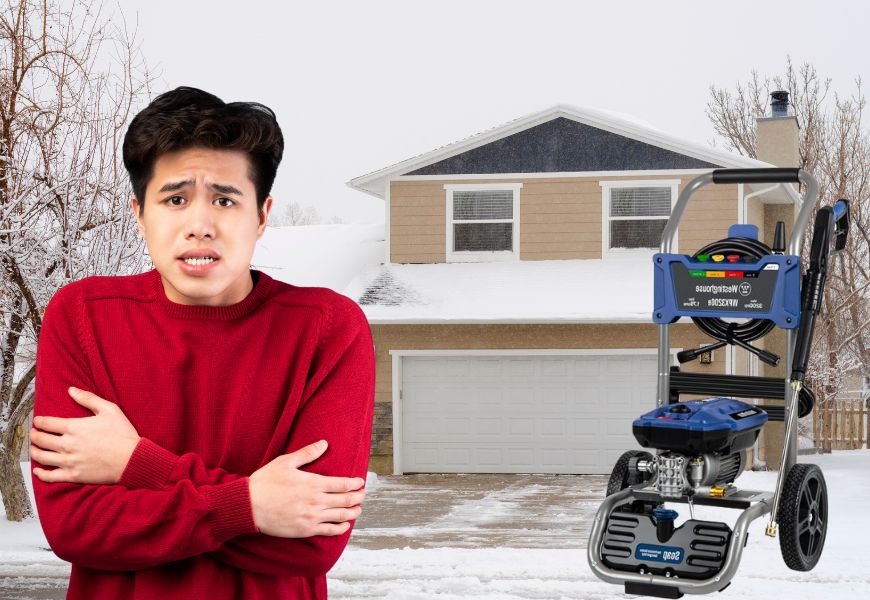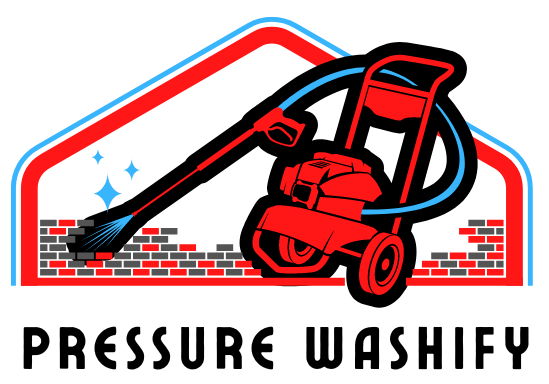Affiliate Disclaimer: This post may contain affiliate links, meaning we get a commission if you decide to make a purchase through our links, at no extra cost to you.
Winter might be known for its cozy fires, hot chocolate, and fun snowball fights. But did you know it’s also an ideal time for some home maintenance tasks? One question often comes up—can you pressure wash in the winter?
When it comes to carrying out this task during the winter, it can be a bit nuanced. In some areas, where it gets chillingly cold, washing your house exterior can be a challenge. On the other hand, in milder climates, it can be a great way to get rid of the winter grime. It’s essential, however, to follow some guidelines to remain safe and ensure you don’t damage your property or pressure washer in the process.
Precautions for Pressure Washing in the Winter
Cold Weather Rated Pressure Washers
First, consider using a pressure washer that’s rated for cold weather. These specialized machines are designed to handle chilly conditions and can resist freezing temperatures better than their regular counterparts. This attribute helps prevent critical components from freezing or getting damaged due to expansion and contraction brought about by the cold.
Continuous Water Flow
Keeping the water flowing can help prevent it from freezing inside the hoses and lines. A sufficient flow of water is vital during winter pressure washing. Pausing for extended periods with the water still in the system can lead to freezing, causing damage to your pressure washer. So be wary of unnecessary breaks.
Avoiding Icy Surfaces
Handling water puts great responsibility on your shoulders. You need to be extra cautious not to spray water on already icy surfaces or create such conditions. This could turn your driveway or walkway into a skating rink, posing significant slip-and-fall hazards for you and others.
Always wear proper pressure washing boots to avoid slipping on wet and icy surfaces while keeping your feet dry and cozy.

Reasons Why Pressure Washing in Winter Can Be Dangerous
As we delve deeper into winter pressure washing, it’s crucial to highlight some potential dangers you might face. Cold weather conditions can turn harmless chores into risky endeavors, and pressure washing is no exception.
Freezing Water and Potential Roof Damage
One of the largest concerns is the risk of water quickly turning to ice after pressure washing. Imagine spraying your roof and creating a layer of ice, causing potential damage and snow load issues. It can also introduce a significant slip hazard, as the melted snow can refreeze into an invisible layer of ice. Clearing such icy layers can be a daunting task, and waiting for the spring may seem like the only method to eliminate the ice.
Challenges with Frozen Gutters
Think about the gutters. When pressure washing in milder climates or seasons, you can easily direct runoff water into gutters. But in winter, these gutters might be full of ice and snow, making it increasingly difficult for the water to find its path. This situation could lead to water overflow, causing damage to your walls and foundation.
Despite these challenges, winter pressure washing is not impossible. It merely requires careful planning, the right tools, and ample safety measures to avert potential dangers.

Benefits of Pressure Washing in the Winter
Winter pressure washing might seem a tough task with very few upsides, yet some benefits could make it worth your effort.
Mold and Mildew Growth
Mold and mildew prefer warm, damp conditions to thrive. When it’s cold outside, the cold temperatures slow down their growth. By applying a mold and mildew cleaner during the winter, you’re maximizing its effectiveness, as the fungi are less likely to grow back quickly. This is a great way to maintain the cleanliness of your house exterior throughout the season.
Preventing the Buildup of Dirt and Grime
The seasonal elements – rain, sleet, ice, and snow – can deposit a significant amount of grime on your house siding, decking, and driveways. Cleaning these parts of your home in wintertime reduces the cumulative dirtying that might significantly discolor and degrade surfaces. By conducting regular winter cleanups, you can maintain your house in top condition, making things easier when the warmer months roll around.
Despite the challenges that come with the chilly season, winter could be an ideal time for pressure washing. It requires additional safety measures, patience, and the right equipment, but the benefits it offers can make it a worthwhile endeavor.
Hiring Professionals for Winter Pressure Washing
Now that you have a fair idea of the challenges and benefits of winter pressure washing, you might wonder whether to go the DIY route or enlist professional help. Below are some reasons why hiring a professional service can be a wise decision.
Expertise and Experience
Professional pressure washing companies have the necessary experience and know-how to handle the task efficiently and safely, even in the winter months. They are well-equipped with high-quality, cold-weather-rated pressure washers and follow proper techniques to work around the potential dangers of winter cleaning.
Safety Concerns
Dealing with water, chemicals, and cold surfaces can be risky during winter. Mishandling can lead to slip accidents, unforeseen damages, and even unintentional injuries. Professional pressure washing services prioritize safety, utilizing equipment such as surface cleaners designed to reduce the risks. By hiring experts, you can avoid the worry and danger that come with DIY winter pressure washing.
Free Estimates
Many professional services provide free estimates for their work. This way, you can gauge the costs and benefits before making a decision. You may find that hiring a professional service offers excellent value, considering the amount of time and effort you’ll save by not tackling the job yourself.
Protecting Your Pressure Washer in Winter
Taking care of your pressure washer during winter is crucial to maintaining its functionality. So, whether or not you’re using your washer during this chilly season, here are a few tips to keep it at its best.
Winterizing the Pressure Washer
Drain all the water from the machine after each use. This practice is vital as resting water can freeze, expand, and possibly damage internal components.
If you’re facing freezing temperatures, don’t skip the use of a good antifreeze pump protector like the STA-BIL Pump Protector. These products not only prevent freezing but also guard the system against rust and corrosion.
Read our detailed guide on how to winterize a pressure washer here.
Regular Cleaning
Keeping your pressure washer clean is another simple tip that makes a big difference. Ensure to clean out the spray nozzles and wand after every use. Just like water, detergent residue can also freeze and cause blockages over time. Routine cleaning helps to avoid these problems.
Proper Lubrication
Lubricating moveable parts is crucial during winter. Cold weather can make some parts stiff and more prone to wear and tear. Lubrication provides an extra layer of protection.
Ensure that you are using the correct pressure washer oil for winter.
Storing the Pressure Washer
Store it in a warm, dry place, ideally indoors. If keeping it in an unheated garage or shed, consider using a space heater to avoid freezing. Also, keep it covered to protect it from dust and debris.
Conducting Routine Checks
Perform regular checks to ensure all parts are functioning correctly. Pay special attention to hoses and seals, as these are more susceptible to damage in cold weather.
Wrap Up
While winter pressure washing comes with its unique set of challenges, including possible roof damage, frozen gutters, and icy surfaces, it also carries several benefits. These include preventing mold and mildew growth, minimizing dirt accumulation, and maintaining your property in better condition.
Safety is crucial in these harsh weather conditions, and that’s why hiring professional pressure washing services might be advantageous. With experienced hands at the task, you can be sure of safety, efficiency, and peace of mind.
But whether you choose to do it yourself or engage a professional, understanding how to protect your pressure washer during winter is another vital piece of the puzzle. From regular cleaning and appropriate storage to the use of a pump protector and regular checks, all steps are necessary to ensure your equipment is ready for use when the warmer months roll in.











